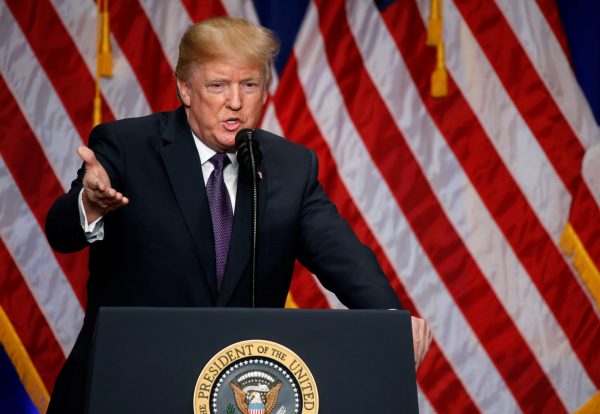In his first year in office, Trump was largely reactive rather than proactive with respect to world affairs. Washington’s response to Pyongyang’s growing missile threat is to bolster allied defences and extended deterrence while it builds a coalition of international pressure on the regime to return to the negotiating table. UN economic sanctions (via the United Nations itself as well as via a growing appetite for secondary sanctions) are the primary mechanism of coercion. Kim Jong-un seems determined to be able to strike the continental United States, so the North Korea problem remains at the top of the Trump administration’s priority list.
The administration is woefully understaffed for the challenges that face the United States. The President’s tweets confound efforts to communicate policy, and the White House’s protracted effort to undermine the Secretary of State ensures that US diplomacy is weak. The administration has been slow to make appointments to high-level foreign policy posts, with the notable exception of the Department of Defense. The lack of expertise on the complex array of foreign policy challenges confronting Washington has left the administration painfully ill-prepared for diplomacy.
2018 will bring some of these difficulties into sharper relief. While the National Security Strategy was the first step towards steadying the administration’s foreign policy, filling out the government ranks of foreign and security policy professionals would go a long way.
Politics will likely obstruct focussed diplomacy. The Republican Party is no longer a predictable, internationalist advocate for US foreign policy. The splintering of the Republican Party and leadership challenges for the Democratic Party make midterm elections in 2018 difficult to predict. One thing is sure: these elections will stir querulous political currents once more and keep Trump focussed on his popularity at home.
Three foreign policy issues will confront the Trump administration in its second year.
First, Washington’s trade policy will create dissonance between the United States and virtually all of its partners (particularly in Asia). While some US pushback on Chinese trade practices is welcome, a tit-for-tat trade war is not. The National Security Strategy takes a harder tack on US China policy — particularly on Beijing’s economic practices — which sets the stage for confrontation.
This alongside the ongoing difficulties in the North American Free Trade Agreement negotiations suggests that 2018 will bring trade to the forefront of US foreign policy. Many US allies are already girding themselves for a far stronger push by Washington to reopen existing agreements and to insist on new bilateral trade agreements on terms more favourable to the United States. As Trump’s trip to Asia in November revealed, the President wants to play hardball on trade — even with allies.
The second problem is North Korea — a problem that is likely to worsen in 2018. Sooner or later, some sort of showdown between the United States and North Korea is inevitable. Pyongyang continues its missile development, and the probability that one or both sides will use some sort of military force continues to be relatively high. With little evidence that Kim Jong-un is interested in abandoning his nuclear ambitions, regional fears over potential conflict on the Korean Peninsula will remain. Maintaining international support for sanctions on North Korea will require constant diplomatic effort.
A third challenge for the Trump administration is its relationship with Russia. The Mueller investigation into Trump’s alleged ties to the Kremlin has expanded to cover several of Trump’s campaign advisors, while congressional committee investigations will continue into 2018. The United States will need to put in place new measures to protect its elections from manipulation from Moscow by the midterm elections. Contrary to early expectations that the President would pursue friendlier relations with Russia, the National Security Strategy now clearly identifies Moscow as hostile to US security interests — a point that drew ire from Russian President Vladimir Putin.
Within the United States, the daily news cycle surrounding the administration’s difficulties is overwhelming. Lost in the drama is a serious debate over policy choices that will have long-term consequences not only for priorities at home, but also for Washington’s landscape abroad. Trump has withdrawn the United States from defining multilateral initiatives on trade and climate change. He has threatened partners into reassessing their economic ties with the United States. While advocating for a bulkier military presence abroad, he has yet to embrace the most important foreign policy tool of all: diplomacy.
While much of the Trump administration’s first year difficulties can be attributed to the President’s inexperience, 2018 will bring far higher expectations of his leadership and ability to demonstrate that his vision for the United States brings results. The honeymoon phase of his presidency is now over. All eyes will be on Trump as he navigates a complex world increasingly challenging to US interests.
Sheila A Smith is senior fellow for Japan studies at the Council on Foreign Relations.
This article is part of an EAF special feature series on 2017 in review and the year ahead.

